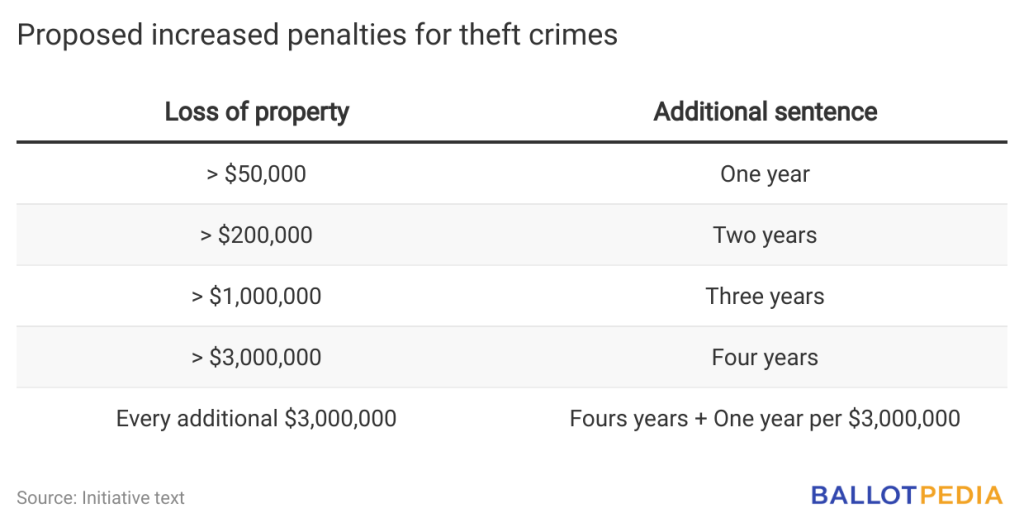Californians for Safer Communities reported filing over 900,000 signatures on April 18 in support of an initiative that would make changes to Proposition 47, which California voters approved in 2014 by a vote of 59.6% to 40.4%. Proposition 47 classified certain crimes as misdemeanors instead of felonies unless the defendant had prior convictions for murder, rape, certain sex offenses, or certain gun crimes; allowed resentencing for those currently serving a prison sentence for any of the offenses that the initiative reduced to misdemeanors; and created the Safe Neighborhoods and Schools Fund to receive appropriations based on savings from the initiative.
The required number of signatures to qualify for the 2024 ballot in California is 546,651—5% of the votes cast in the preceding gubernatorial election.
The proposed initiative would make changes to how the state classifies drug-related and theft crimes.
Changes to penalties for crimes related to certain illegal substances
The initiative would classify certain drug offenses as treatment-mandated felonies. A treatment-mandated felony would apply to individuals with two or more prior convictions for various drug crimes, like possession or distribution, who are found possessing fentanyl, heroin, cocaine, or methamphetamine. If the individual agrees not to contest the charge, the person is referred to treatment after a substance use and mental health treatment evaluation. Individuals who successfully complete treatment would have their felony dismissed. The initiative would require individuals who do not complete treatment to serve up to three years in state prison. Currently, state law classifies the possession of illegal drugs as a misdemeanor.
The initiative would increase penalties for certain drug crimes by increasing sentence lengths and level of crime. The initiative would also add fentanyl to the list of drugs (cocaine, heroin, and methamphetamine) that would warrant a felony charge if an individual possesses one of the listed drugs and a loaded firearm. The punishment for this crime is up to four years in prison. Currently, possessing fentanyl and a loaded firearm is punishable by up to one year in jail.
The initiative would require courts to warn individuals convicted of distributing illegal drugs of their potential future criminal liability if they distribute deadly drugs like fentanyl, heroin, cocaine, and methamphetamine. The initiative would also require courts to warn individuals who distribute deadly drugs to persons who die from them that they could be charged with murder.
Changes to penalties for certain theft crimes
The initiative would increase penalties for certain theft crimes. For crimes where money or property worth $950 or less is stolen, the initiative would make the crime punishable as a felony for individuals who have two or more prior theft-related convictions. The initiative would make the punishment up to three years in jail or prison depending on their criminal history. Currently, it is punishable by up to six months in jail. The initiative would also increase sentences based on the amount of property stolen. The proposed increases are below:

In 2020, California voters rejected Proposition 20, a citizen initiative that would have made specific types of theft and fraud crimes, including firearm theft, vehicle theft, and unlawful use of a credit card, chargeable as misdemeanors or felonies, rather than misdemeanors. The ballot initiative would have also established two additional types of crimes in state code—serial crime and organized retail crime—and charged them as wobblers (crimes chargeable as misdemeanors or felonies). It was defeated by a vote of 38.3% in favor to 61.7% against.
The committee behind the 2024 initiative reported $1 million in contributions through Dec. 31, 2023. The top three donors included Walmart, EnvisionRX CEO Kevin Nagle, and the California District Attorneys Association.
The initiative received endorsements from State Rep. Vince Fong (R-32), San Francisco Mayor London Breed, San Jose Mayor Matt Mahan, California Police Chiefs Association, California Retailers Association, Target, and Walgreens.
Greg Totten, chief executive officer for the California District Attorneys Association, said, “We continue to see an outcry of overwhelming support from Californians of every political affiliation and geographic region across the state demanding for change that will improve community safety and hold repeat offenders of theft and serious drug crimes including those involving fentanyl accountable. Californians want to feel safe in their neighborhoods and when they shop, and this initiative amends Prop 47 to effectively hold individuals accountable for repeat crimes of theft and serious drugs like fentanyl while making sure individuals receive and complete drug and mental health treatment they need.”
Ballotpedia has not identified any committees registered in opposition to the initiative.
Assembly Speaker Robert Rivas (D-29), who supports a legislative package of bills to address theft in the state, said, “There’s no turning back the clock on the criminal justice reforms that have been enacted. It’s understanding the root causes of this problem, which is complex. And for us, each one of these bills gets after those layers of complexity.” He also said, “Going to the ballot to address retail crime or theft is not necessary, because the Assembly’s bipartisan and comprehensive plan delivers real and urgent changes for Californians.”
If the legislature proposes substantive changes to Proposition 47, voters would have to approve them. In addition, if the state legislature and initiative sponsors come to a legislative compromise, state law allows initiative sponsors to withdraw initiatives 131 days before the election after qualifying for the ballot.
Six initiatives have qualified for the Nov. 5 ballot in California. Between 2010 and 2022, an average of nine initiatives qualified for even-numbered year ballots, with an average of 82 filed each cycle.
Additional reading:


